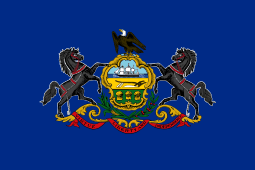Pennsylvania Historical and Museum Commission
|
Logo of the PHMC | |
| Agency overview | |
|---|---|
| Formed | June 6, 1945 |
| Preceding agency |
|
| Jurisdiction | State government of Pennsylvania |
| Headquarters |
State Museum Building, 300 North Street Harrisburg, Pennsylvania 17120 40°15′57″N 76°53′6.5″W / 40.26583°N 76.885139°W |
| Agency executives |
|
| Website | www.phmc.state.pa.us |
The Pennsylvania Historical and Museum Commission (PHMC) is the governmental agency of the Commonwealth of Pennsylvania responsible for the collection, conservation and interpretation of Pennsylvania's historic heritage. The commission cares for historical manuscripts, public records, and objects of historic interest; museums; archeology; publications; historic sites and properties; historic preservation; geographic names; and the promotion of public interest in Pennsylvania history.[1]
PHMC was established June 6, 1945, by state Act No. 446, merging the Pennsylvania Historical Commission, Pennsylvania State Museum and Pennsylvania State Archives.[2]
The Commission is an independent administrative board, consisting of nine citizens of the Commonwealth appointed by the Governor; the Secretary of Education ex officio; two members of the Senate appointed by the President Pro Tempore and Minority Leader; and two members of the House of Representatives appointed by the Speaker and Minority Leader. As of April 2014, the chairman is Andrew Masich and the executive director is James Vaughan. PHMC Commissioners as of April 2014 are John A. Barbour, Karen Dougherty Buchholz, Susan M. Corbett, Jim Ferlo, Senator, William V. Lewis, Robert Matzie, Representative, Ann M. Moran, Jean Craige Pepper Victor, Scott Petri, Representative, Fredrick C. Powell, Richard M. Sand, Joseph B. Scarnati III, Senator, Carolyn Dumaresq, ex officio, Acting Secretary of Education.
PHMC Mission: The PHMC works in partnership with others to preserve the Commonwealth's natural and cultural heritage as a steward, teacher and advocate for the people of Pennsylvania and the nation.
PHMC Vision: The PHMC enriches people's lives by helping them to understand Pennsylvania's past, to appreciate the present, and to embrace the future.
Historical marker program
The PHMC administers the Historical Marker Program, which installs bronze plaques to commemorate individuals, events, and landmarks throughout the state. The program was launched in 1914 by the Pennsylvania Historical Commission, the predecessor to the PHMC. The signs were redesigned in 1945–46 to make them easier to read from a passing car. The PHMC has posted criteria for inclusion for new markers and accepts marker proposals from the public.[3]
Pennsylvania Heritage
PHMC also publishes Pennsylvania Heritage magazine in conjunction with the Pennsylvania Heritage Foundation.
List of PHMC administered sites in Pennsylvania
- Brandywine Battlefield
- Bushy Run Battlefield
- Conrad Weiser Homestead
- Cornwall Iron Furnace
- Curtin Village at Eagle Ironworks Historical Site
- Daniel Boone Homestead
- Drake Well Museum
- Eckley Miners' Village
- Ephrata Cloister
- Erie Maritime Museum and U.S. Brig Niagara
- Fort Pitt Museum
- Graeme Park
- Hope Lodge and Mather Mill
- Landis Valley Museum
- Old Economy Village
- Pennsbury Manor
- Pennsylvania Anthracite Heritage Museum
- Pennsylvania Lumber Museum
- Pennsylvania Military Museum
- Pennsylvania State Archives
- Joseph Priestley House
- Railroad Museum of Pennsylvania
- Scranton Iron Furnaces
- Somerset Historical Center
- The State Museum of Pennsylvania
- Washington Crossing Historic Park
See also
- History of Pennsylvania
- List of Pennsylvania state historical markers
- Western Pennsylvania Conservancy
- List of Pennsylvania state agencies
References
- ↑ PMHC Official Website
- ↑ Beyer, George (1991). Guide to the State Historical Markers of Pennsylvania. Harrisburg, PA: Pennsylvania Historical & Museum Commission. p. 3. ISBN 0-89271-040-3.
- ↑ PHMC Historical Marker Program

